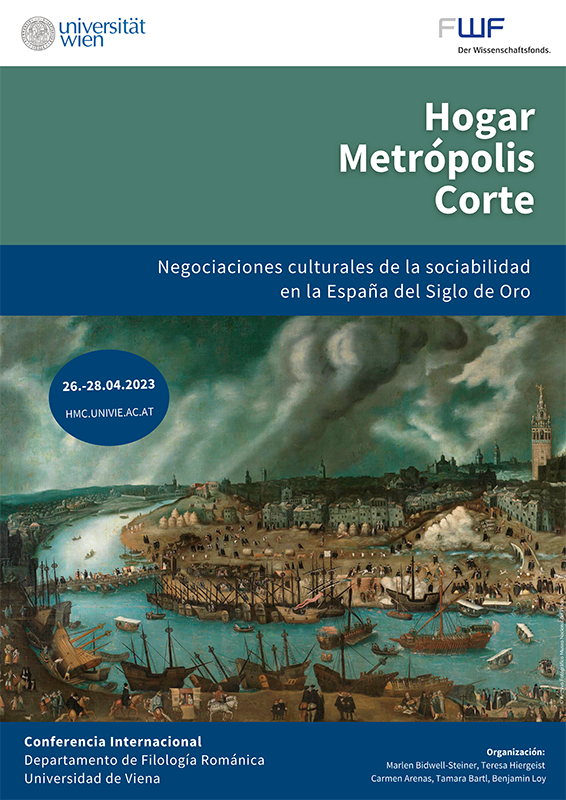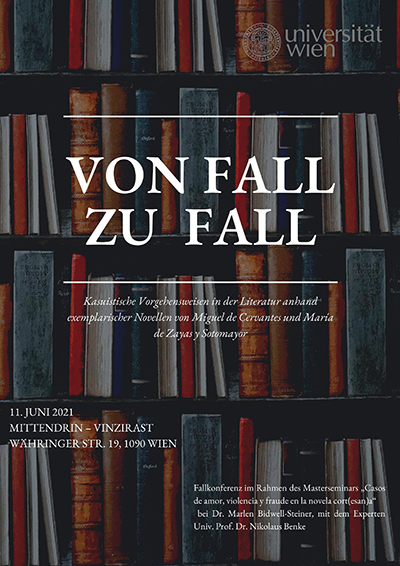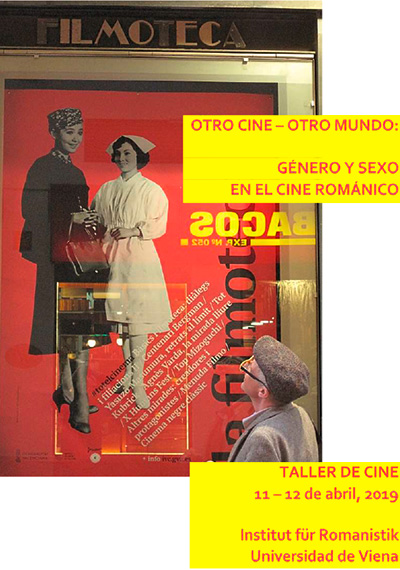Activities
Preview
Recap
„Syphilisdarstellungen zwischen politischer Botschaft, Männlichkeitsbeweis und Stigma weiblicher Laster“,
Talk at the international Workshop Das abjekte Bild. Affektive Bildlichkeit zwischen den Medien in der Frühen Neuzeit, organisiert vom Exzellenzcluster »Temporal Communities: Doing Literature in a Global Perspective«.
April, 26–28, 2023, Department of Romance Studies

“Hogar, Metrópolis, Corte. Negociaciones culturales de La Sociabilidad en la España del Siglo De Oro”,
Organization of international conference at the University of Vienna in cooperation with Teresa Hiergeist;
Lecture within this framwork:
Juegos cortesanos entre divertimiento y seriedad
Esta ponencia se dedica al devenir de un importante miembro de la sociedad del siglo XVI: el cortesano. En el inestable mercado de poderes de la corte de los Austrias esta figura se versa en diferentes actividades sociales: vejámenes literarios, torneos, juegos de azar e intrigas políticas. La Filosofía cortesana de Alfonso Barros (1587) condensa estos elementos para formar una obra didáctica y a la par una escuela del desengaño. Al cotejarla con textos casuísticos contemporáneos y con tratados en el molde del Cortegiano de Baldassare Castiglione (1528) se deja constatar un cambio semántico de ocio a ociosidad o sea de un tiempo de recreo valioso a tiempo desperdiciado. Se mostrará que la capacidad juguetona de calibrar el margen entre el entretenimiento vano y el arte elevado de diplomacia forma una variedad del concepto del yo moderno que nace en esta época. Para tener éxito este yo cortesano depende cada vez más de la afirmación especular de las relaciones entre el género masculino.
Moderation of the launch of two new issues of the book series
Sigmund Freuds Werke. Wiener Interdisziplinäre Kommentare: Bruchstück einer Hysterie-Analyse; Der Mann Moses und die monotheistische Religion.
“Purity and Pollution – the Early Modern Discourse of Othering in the Context of Venereal Diseases”,
Talk at the International Conference Bodies, Remedies, Policies: From Early Modern Chronicles of the Indies to Covid-19 Narrative, organized by Romana Radlwimmer.
Quarrels over the “birth” of plagues mostly prove to be unproductive. Yet, they testify to the social treatments of anxieties and phantasies and are therefore a good lead to understand significant ruptures in the fabric of Early Modern culture. To trace the enormous bearing of the syphilis on European regulations and mentalities, I will confront medical treatises and colonial chronicles with literary texts from the first half of the 16th century. A central figure in my re-reading will be Francisco Delicado whose Lozana Andaluza, in tandem with his nonfictional texts are good examples for the shifting semiology of sickness between a batch of virility and a stigma of the impure female body.
I will point to the many explanations in Spanish, Italian and German writings, which are relying on well-established mythologies and prejudices such as jews poisoning wells, astrological signs and divine ordeals. The plague affirms evil. Yet, it is an evil that inexorably sticks on the Other: Amerindian (and) women.
Nov., 10–11, 2022, Freie Universität Berlin
“How to become an ideal courtier in 63 playful moves: the filosofía cortesana moralizada by Alonso Barros (1587)”
Talk at the workshop »Illustration and the Arts of Memory«, organized by Exzellenzcluster 2020 »Temporal Communities: Doing Literature in a Global Perspective) .
This paper focuses on a quite peculiar artifact of early modern Spain: a board game that is accompanied by an aphoristic text serving as instruction for the players and bearing the somewhat overblown title filosofía cortesana moralizada. Together game and text can be considered as a playful tuition for how to succeed at court.
The author, Alonso Barros, was a royal clerk and dedicated his board game to one of king Philip II’s closest advisors, Mateo Vasquez de Leca. This Andalusian of poor and most likely Jewish ancestry can be considered as a role model for a social climber. In a discrete and systematic way, Vasquez de Leca managed to eliminate his powerful rivals and – in 16th century Spain quite remarkable – to fashion himself a pompous coat of arms which not only is printed in Barros’ text but is also rhetorically highlighted by the author.
I will take this lead and situate the apparently very popular game-text-ensemble within the buffoonery of Hapsburg court culture. In a further step the “morals” of the text shall be read against the backdrop of casuistical manuals on games, such as Francisco Luque Facardo’s Deseñgano contra la ociocidad y los juegos (1603).
Oct., 6–7, 2022, Department of Romance Studies

“Urdimbre y tram(p)as: fraudes, enredos y artimañas en el tejido literario del Siglo de Oro”
International Early Carreer Workshop at the University of Vienna, organized in cooperation with Carmen Arenas Cuenca and Tamara Bartl;
Promesas matrimoniales, monedas, títulos, patrimonios,…– los textos de los siglos XVI y XVII están llenos de trampas y falsificaciones. No solo los fraudes y enredos de las comedias, novelas cortas y novelas picarescas, sino también los de los debates filosóficos, atestiguan la dinámica de una sociedad cambiante y apuran tensiones, para transmitir una ética más eficaz y para mostrar a la vez huecos y alternativas.
Por supuesto, la capacidad de la literatura no se agota en esta función utilitaria más evidente. Experimentar cómo otra persona queda entrampada en el modo de la ficción aumenta el suspense, da placer mirón, y como tal ayuda a soltar la presión emocional. Las artimañas verbales por parte de una mujer, así como de una persona llana, desquician el declive de poder patriarcal y por identificación, nutren la agencia del público. Para mantener el entretenimiento de receptores cada vez más versados, la función lúdica se manifiesta en peripecias más y más enredadas.
Pero a la par de la historia, hay también trampas en el nivel discursivo: la obsesión barroca por el motivo del (des)engaño no es mera casualidad. La retórica aprovecha todo su repertorio para inventar un arte de la disimulación. A ello contribuyen los juegos figurativos de traspaso, como por ejemplo las osadas metáforas en relación con cualquier interacción humana velan unos aspectos y desvelan otros; la paradoja y el desarrollo de quodlibeta que revelan la percepción de fenómenos ambiguos; las aproximaciones probabilísticas de los moralistas que facilitan el decir medias verdades salvando la cara… En suma, la complejidad del ser moderno nace de estas formas simbólicas. A nivel colectivo, las falacias de la ficción aumentan la capacidad de fingir, de simular, o sea, de anticipar soluciones futuras.
Nuestro taller pretende reconstruir estos diferentes hilos del tejido literario en cuanto a la trampa: la trampa como tema, la trampa como motivo, pero también como hilo trazador en la urdimbre de la ficción. Perseguimos una imagen más compleja de la literatura del Siglo de Oro como práctica cultural que nos entrampa y nos enreda – infinitamente, para mayor fortuna.
“Laughing in” and “Laughing Out” in La pícara Justina (1605): Courtly Buffoonery in Female Disguise.
Talk at the Annual Meeting of the Renaissance Society of America, within the panel Dark Jokes and Laughing Artists: Early Modern Art and Humor, organized by Hollie Buttery and Sarah Rosenthal.
This paper focuses on one of the most eloquent female tattlers in Spanish literature: La pícara Justina. Her loose tongue spares no one – not even her monstruous family. Mingling quotes from classical sources with contemporaneous cant into a hilarious gibberish, she lays bare the collective obsessions of Spanish baroque society: lineage as a trope for (noble, Christian) ancestry and for sexual integrity.
Little is known about the alleged author of the text, López de Úbeda, a physician of the King’s favorite. This is why there is an ongoing debate about alternative authorships and the text’s intention. As Roncero López (2010) has shown, the text can by understood as a court buffoonery and thereby points to “real” gossip at the court of Philip III. Following his suggestions, this paper traces Justina’s taunts in the light of courtly strategies in “laughing in – constructing a courtly identity – and laughing out – vilifying rivals.
December, 10, 2021, 14:00-18:00
(digital-synchron)
Participation in a workshop entitled
„Das (lange) goldene Jahrhundert des Romans. Wege des spanischen und deutschen Romans zwischen Heliodorschema und Novation“
at FU Berlin, organized by Paolo Brusa and Stefan Seeber.
October, 21, 2021, online
“Coloniality and Global Encounters in the Culture/History of the Romania”
at the University of Tübingen, organized by Romana Radlwimmer and Adrian Masters
July, 28, 2021
Sparkling Casuistry: Silver, Greed and Penitence in Early Modern Spain
Talk at the International Conference The Matter of Silver: Trauma, Substance, Surface, Shimmer, organized by Hellen Hill and supported by the British Academy.
This paper takes casuistical writings as a stepping stone for a quite peculiar case study. My case brings together three almost contemporary personalities of Sevillian ancestry whom the flow of American silver affected in quite different ways. The first is the Dominican casuist Tomás de Mercado (1525–1575), today considered as one of the originators of “Iberian monetarism”, a proto-capitalist economic theory. The second one is Antonio de Calancha (1584-1654), an Augustinian friar who wrote an extensive chronical of the Colonization of “Peru” (now Bolivia). The last one is the real protagonist of my case: Mateo Vásquez de Leca (1573-1649), a noble churchman and heir of an impressive wealth originating from the New World. Mateo Vásquez de Leca’s life story as an exemplary narrative of the Spanish collective unconscious reveals the dark undertow of the flow of silver from the colonies overseas: exploitation and forced Christianization of the indigenes.
Freud Museum
Die unendliche Analyse.
Podiumsdiskussion gemeinsam mit Thomas Aichhorn und Helga Klug, organisiert von Esther Hutfless.
mittendrin, Währingerstr. 19, 1090 Wien

From Case to Case
Workshop on Casuistry with
Mariacarla Gadebusch Bondio, Professor of Medical Humanities at the University of Bonn (via Zoom);
Nikolaus Benke, Professor of Roman Law at the University of Vienna
Tribunal, consulting room, confessional box: three spaces where problem cases are interrogated in terms of concrete circumstances. Thereby the reconstruction of the case becomes condensed narration. In contrast, the Early Modern novella offers the construction of an imaginative case. The narrative emplotment culminates in more or less happy ends and thus, at least ostensibly, passes as a life guidance support.
In this workshop we present exemplary novellas by Miguel de Cervantes and María de Zayas to experts in the field of medicine, law and ethics to better understand how literature assimilates casuistic procedures. We assume that the pleasure of storytelling and abstraction disclose the voids and contradictions of disciplinary knowledge and thus contribute to its further elaborations.
April, 15/16, 2021
Online-Conference
Blindfolded Justicia and Other Female Allegories in European Iconographies
Talk at the Conference Gender: Ambivalent In_Visibilities
organized by the Research Platform GAIN at the University of Vienna.
In this talk I focus on a series of allegories of young beautiful maidens that are representing core values of the European identity. As will be shown, these figures not only resemble each other, but also are closely interrelated and even conflated in a history of longue durée. Tracing their trajectory in becoming hypostasized can be read as an example of Aby Warburgs theory of “Pathosformel”. My feminist reading unveils the pathos as an ongoing process of disabling and blinding women in patriarchal societies – from biblical Hagar to Early Modern Synagogue to Blindfolded Justicia. In a further step I will trace their nachleben in Postmodern digital culture.
Wolfenbüttel
Die sprechende Wunde der Toten in der frühneuzeitlichen Literatur Spaniens.
Vortrag im Rahmen der Internationalen Jahrestagung des Wolfenbütteler Arbeitskreises für Renaissanceforschung „Eternal Wound – Die „Ewige Wunde“ in der Frühen Neuzeit, veranstaltet von Mariacarla Gadebusch Bondio (Bonn) und Marc Föcking (Hamburg).
12./13. Juli 2019
München
Prekäre Männlichkeit im Puppenheim: Beispiele aus dem spanischsprachigen Film.
Vortrag im Rahmen der interdisziplinären Tagung “Objekte & Organismen. Verlebendigung, Verdinglichung, Verwandlung” an der Ludwig-Maximilians-Universität München
Institut für Romanistik Wien
Chair des ersten Panels im Rahmen der Internationale Tagung
„Passagen: Walter Benjamin und Antonio Gramsci“
organisiert von Birgit Wagner und Ingo Pohn Lauggas
23.05.2019, 14 Uhr
Dachgeschoß Juridicum Wien
Addio Benke
Respondenz im Rahmen des Abschiedskolloquiums zu Ehren von Univ.Prof. Nikolaus Benke

Anderes Kino – andere Welten.
Geschlechterrepräsentationen im Kino der Romania
Eintägiger Workshop am Institut für Romanistik, Universität Wien
Dieser Impulsworkshop war Auftaktveranstaltung eines medienwissenschaftlichen Forschungsschwerpunkts innerhalb des Instituts für Romanistik, der sich aus intersektionaler Weise dem Thema der Alterität annähert.
Entlang von drei Denkachsen soll die Kategorie de_r „Anderen“ hinterfragt werden:
- Filme, die die Kategorie Gender problematisieren;
- Filme, die postkoloniale Erfahrungs- und Erlebnishorizonte thematisieren;
- Filme, die sich dezidiert abseits des Mainstream verstehen (Stichwort „Off-cinema“).
Monday, March 18, 2019
Casuistry in Early Modern Spanish Literature I und II
Organization of two panels at the
65th Annual Meeting of the RSA, Toronto, Canada in Kooperation mit Michael Scham
Session Papers:
The Exploration of Circumstance: Casuistry and the Novela Bizantina (Anita Traninger)
Lovers’ Quarrels: Amorous and Legal Casuistry in the Spanish Sentimental Romance (William Childers)
La casuística del desquite legítimo en la Segunda parte del Guzmán de Alfarache de Alemán (David Alvarez Roblin) Splitting Hairs or Finding Threads: The Labyrinth as Metaphor for Moral Dilemma in the Comedia (Hilaire Kallendorf)
Unique documented criminal cases in early modern Spain. A taxonomical attempt (Elena del Rio Parra)
Law and Crime in the Celestina (Marlen Bidwell-Steiner)
Casuistry’s Rise and the Crisis of Exemplarity (Michael Scham)